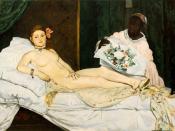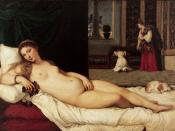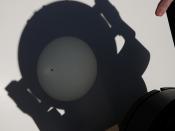In this essay I aim to compare three writers' opinions and attitudes towards the nude, these writers being Castagnary , Zola and Clark . I will also discuss whether or not I think their comments offer an adequate response to the nude, while referencing two works from the Salon of 1863- Alexandre Cabanel's "Venus" (fig. 1) and Edouard Manet's "Olympia" (fig. 2).
The nude in art has been a consistent theme and subject for artists throughout the history of art, be it religious art or portraiture, the human form has always fascinated mankind . However attitudes and opinions about the 'right' and 'wrong' kind of nudes differ hugely, as I will discuss. In the controversial salon of 1863 crowds were dismayed and outraged by Manet's Olympia, with her direct gaze and 'unacceptable' standards of modelling and composition, but were delighted with Cabanel's Venus (which subsequently was purchased by emperor Napoleon III ), that possessed all the 'refined eroticism' that was expected of salon goers of the time.
Castagnary epitomises this idealised view of the nude in his account of 1863 when he uses the words 'dazzling, immaculate and naked beauty' to describe the nude form of the goddess Venus.
Castagnary also comments on Venus's 'harmonious pose' and 'pure, well arranged contours'. Cabanel's Venus is perfectly, technically drawn- idealised, devoid of any blemish or body hair. She is sexually passive, characterless and more perfect than is humanly possible- which fitted with the accepted style of the time. According to Frances Borzello, Cabanel adheres to a strict set of conventions when he paints his Venus as 'historically, the reclining nude is painted in the guise of a classical goddess and tends to lie with her eyes turned from the spectator, half closed, or even closed (as in Cabanel's piece), offering no...


